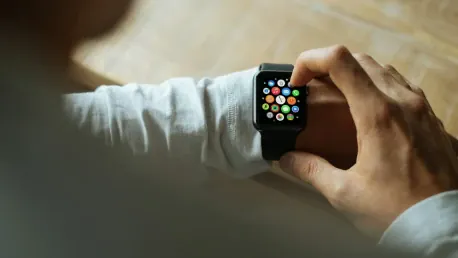The world of wearable technology has evolved dramatically since the launch of the Fitbit in 2007. Initially, wearable devices like the Fitbit were primarily used to track basic fitness metrics such as steps and calories burned. Fast forward to today, the landscape of wearable technology now includes advanced devices like smartwatches and smart rings that can perform complex health monitoring tasks, including calling emergency services, predicting illnesses, and offering personalized health insights. This summary aims to explore the transformative impact of wearable tech on healthcare, spotlighting the innovations and future trends in this rapidly evolving sector.
The Evolution of Wearable Health Tech
The first decade of wearable health tech was focused on deploying these devices to as many users as possible, aiming to make health tracking accessible to a broader audience. Wearables were primarily concerned with basic metrics such as steps and calorie counts. However, in the past decade, there has been a noticeable shift towards capturing more diverse and precise health metrics. Today’s wearables not only record more intricate data such as heart rate variability and stress levels but also provide instant feedback and actionable insights that can actively guide users in their daily health decisions.
Additionally, newer forms of wearables, like smart rings, have been developed to offer less obtrusive and longer-lasting alternatives to traditional smartwatches. These advancements have made it possible for users to monitor their health continuously without the need for frequent recharging or bulky devices. This evolution signifies a critical step towards more seamless and user-friendly health monitoring, which enhances user adherence and satisfaction. Consequently, the progression in wearable technology not only expands the scope of health data collected but also refines how this data is used to improve individual health outcomes.
Advancements and Current Capabilities
One significant player in the wearable tech space, Samsung, has outlined its vision for creating a comprehensive health system that includes measuring current health statistics, providing personalized insights and coaching, and connecting users to healthcare providers and caregivers. While Samsung’s Galaxy Watches and Galaxy Rings already measure various health metrics and offer personalized guidance, the next major milestone is enhancing the connection between wearable users and healthcare providers. This connection aims to facilitate more comprehensive and personalized care, ensuring that real-time health data can be efficiently utilized by medical professionals to manage and treat patients proactively.
On the other hand, Withings has already taken significant steps towards creating a more integrated health monitoring ecosystem. The company has introduced a feature named Cardio Check-Up, which leverages data from Withings devices to receive evaluations and feedback from certified cardiologists. This service represents a significant collaboration with Heartbeat Health Partners and is a major step toward the goal of real-time health data analysis and remote consultations. By bringing certified cardiologists into the fold, Withings aims to bridge the gap between consumer health data collection and professional medical analysis, thereby providing users with more accurate and actionable health insights.
Future Trends and Emerging Partnerships
The future of wearable health technology lies in forming strong partnerships between tech companies and healthcare providers. Such collaborations are seen as the driving force behind the continued advancement and adoption of wearable health devices. For instance, the smart ring manufacturer Oura has partnered with Essence Healthcare to provide Medicare Advantage members with complimentary Oura Rings and app subscriptions. This partnership, the first of its kind, underscores the enormous potential for wearable tech to support value-based care models focused on patient outcomes over time. By integrating wearable data into broader healthcare strategies, these partnerships are poised to transform how health services are delivered and managed.
Beyond these examples, the narrative extends to continuous efforts by companies like Apple, which has introduced innovative health features through its devices. The Apple Watch Series 10, for example, includes a sleep apnea detection tool, while the AirPods Pro 2 offers an AI-powered hearing test, essentially functioning as hearing aids. These features not only enhance the user experience but also encourage proactive healthcare by providing critical health data that users can share with their medical professionals. Such advancements underscore the broader trend of integrating cutting-edge technology into everyday health management tools, thereby empowering users to take a more active role in their health.
Challenges and Considerations
Despite the promise of wearables, there are concerns regarding the misuse or insufficient protection of customer data. Specific issues could arise with tech companies and healthcare providers potentially charging different premiums based on monitored health data, similar to how insurance companies use in-car monitoring devices to offer lower rates to safe drivers. However, actual policies and practices are yet to be determined, and such concerns remain speculative at this stage. Therefore, while the potential for personalized health insurance products exists, it is crucial to navigate these waters carefully to prevent any unintended ethical or privacy issues.
A key challenge that wearable technology faces is ensuring the confidentiality and security of health data. As wearable technology integrates deeper into healthcare systems, safeguarding patient information against breaches and misuse becomes critical. Addressing these concerns will be paramount to maintaining user trust and ensuring the sustainable growth of wearable health technology. Ensuring robust data security measures and transparent privacy policies is essential to guarantee that users’ health information is protected, instilling confidence that their data is handled responsibly.
Synthesis and Unified Understanding
The advent of wearable technology in healthcare represents a paradigm shift toward more connected, personalized, and proactive health management. Wearables are moving beyond simple data presentation to provide context and actionable insights, helping users make informed decisions about their health each day. The narrative highlights how integrative approaches involving partnerships between tech companies and healthcare providers can lead to improved patient outcomes and more efficient care delivery. By seamlessly blending consumer tech with professional healthcare, wearables are redefining traditional health paradigms.
For instance, the Oura Ring’s partnership with Essence Healthcare illustrates how wearables can support longitudinal care by providing real-time health data to care teams. This data not only highlights an individual’s health status but also fosters more meaningful discussions between patients and healthcare providers about improving lifestyle choices and managing health conditions. Consequently, such partnerships can elevate the role of wearables from mere trackers to essential tools in preventive health and chronic disease management.
Moreover, user testimonials from platforms like Reddit underscore the tangible benefits of wearable technology. These devices have helped individuals receive timely medical diagnoses by flagging irregular health patterns, illustrating the practical impact of wearables on daily health management. The ability to detect potential health issues early on can lead to more timely interventions, reducing the burden on healthcare systems and improving patient outcomes.
Market Prospects and Growth
The market for wearable medical devices is predicted to expand significantly in the coming years, from $91.21 billion in 2024 to $324.73 billion by 2032. This growth trajectory is driven by technological advancements, regulatory changes, improved data-sharing standards, and increasingly empowered healthcare consumers. As more individuals become aware of the benefits of continuous health monitoring, the demand for such devices is expected to skyrocket. This soaring interest underscores the critical role wearables are set to play in the future of health management.
As Oberfest from Oura points out, the second decade of wearable tech revolves around providing better context for health data, enabling users to make more informed decisions. By interpreting the data collected by wearables, individuals can gain a deeper understanding of their health, leading to more proactive and preventive health behaviors. The convergence of AI, user-generated health data, and professional medical oversight can bridge gaps in primary care, reduce burdens on healthcare systems, and promote healthier communities.
To ensure the sustainable integration of wearable health tech into mainstream healthcare, it will be essential to address privacy concerns proactively, establish robust data security measures, and foster transparent and equitable practices in the utilization of health data. By doing so, the healthcare industry can create an environment where wearable technology not only enhances patient outcomes but also maintains the trust and confidence of its users. As we move forward, the evolving landscape of wearable technology promises to revolutionize healthcare, making it more connected, efficient, and patient-centered.
Transforming Healthcare Delivery
The world of wearable technology has seen remarkable changes since the Fitbit debuted in 2007. At first, devices like the Fitbit mainly tracked simple fitness metrics such as steps taken and calories burned. However, the landscape of wearable tech has dramatically expanded and now encompasses sophisticated devices like smartwatches and smart rings. These modern wearables are capable of performing advanced health monitoring tasks that were unimaginable just a decade ago. From calling emergency services in critical situations to predicting illnesses and offering tailored health insights, wearable tech has significantly advanced.
These innovations are not just about tracking fitness anymore; they are transforming the healthcare sector. Today’s wearables can monitor heart rates, sleep patterns, and even detect irregularities that may indicate serious health issues. The integration of artificial intelligence and machine learning has further enhanced the capabilities of these devices, making them more intuitive and personalized.
Looking ahead, future trends in wearable technology are expected to push the boundaries even further. We may see devices that can provide real-time health diagnostics, offer mental health support, and integrate seamlessly with other smart home technologies. Overall, wearable tech is set to revolutionize the way we approach personal health and wellness.









